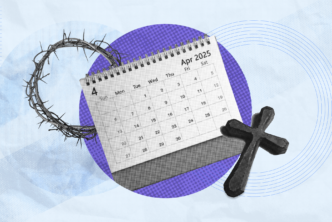Could this be the Messiah? After so many years, had God finally sent his Anointed One to deliver his people? Would the rightful King now take his throne?
Indeed, the Messiah had come—Jesus was here! His disciples believed in him. They publicly confessed, “You are the Christ, the Son of the living God” (Matt. 16:16). They knew that he had come for their deliverance.
Yet even his disciples did not really understand what Jesus had come to do. They expected the Messiah to be a warrior king. They wanted him to reinstate the kingdom of Israel, to start a revolution, to overthrow their oppressors by force, to deliver them from Rome. But Jesus had a different deliverance in mind.
Deliverance through his love
“The reason the Son of God appeared,” we read in 1 John 3:8, “was to destroy the works of the devil.” Jesus came to save his people not from Rome or from any other earthly oppression, but from their sins (Matt. 1:21). And his people include far more than Israel—Jesus came to deliver the whole world from sin.
His methods weren’t what the disciples expected, either. They expected Jesus to pick up a sword and fight, but he said that “all who take the sword will perish by the sword” (Matt. 26:52). He instructed his followers to “love your enemies . . . and you will be sons of the Most High” (Luke 6:35).
Jesus knew that evil cannot be overthrown by force. Deliverance can only come through sacrificial love. His own glorification could only be achieved by laying down his life.
And Jesus answered them, “The hour has come for the Son of Man to be glorified. Truly, truly, I say to you, unless a grain of wheat falls into the earth and dies, it remains alone; but if it dies, it bears much fruit.” (John 12:23–24)
Jesus, God in flesh, willingly gave himself up. He took our sin and allowed the powers of darkness to do their worst to him. And in so doing, he broke their power.
When he was reviled, he did not revile in return; when he suffered, he did not threaten, but continued entrusting himself to him who judges justly. He himself bore our sins in his body on the tree, that we might die to sin and live to righteousness. By his wounds you have been healed. (1 Pet. 2:23–24)
Fruit for his kingdom
Through Jesus’ sacrificial death, we have deliverance. But we too must die if we are to bear fruit. We must die to our sins, and we must die to ourselves. Just as Jesus gave up his rights and died on the cross, we must give up the rights we think are ours. We must give up whatever it is we’re clinging to and live a life of sacrificial love.
But of course Jesus did not stay dead—God raised him back to life and vindicated his suffering. And so our sacrifice for Christ will not be in vain, either. From our death to self, God will raise up much fruit for his kingdom.
But are we willing to die?




